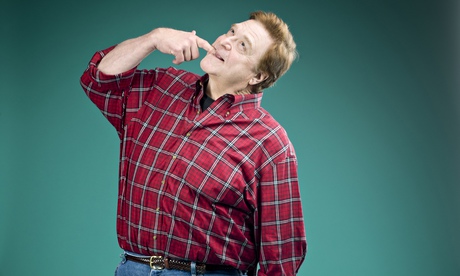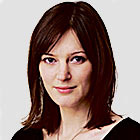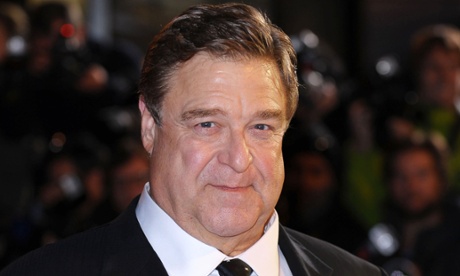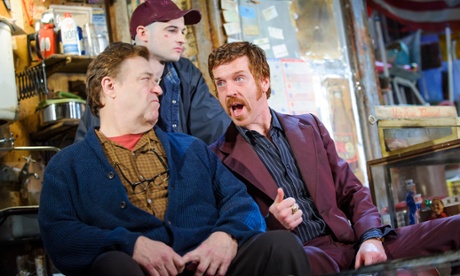In 1975, when he was 23, John Goodman moved to New York to make it as an actor. He had no money, no agent and no contacts. His father, Leslie, had died when Goodman was two years old. His mother, a waitress at Jack and Phil’s Bar-B-Que restaurant in St Louis, Missouri, had little idea about what being an actor entailed and didn’t really understand the notion.
“I don’t think she cared just as long as I was happy,” says Goodman, 40 years later on the eve of his West End debut in an all-star production of David Mamet’s American Buffalo. “And I think the concept was just so foreign to her that it just didn’t register as anything to object to.”
But Goodman felt propelled by an urge he can’t quite name, even now. Growing up, he had loved watching Richard Boone in the television series Have Gun – Will Travel. Then he studied drama at Missouri State University and fell in love with the craft. He says he had to go because, “I knew that if I didn’t, I’d regret it – if I didn’t at least try.” With a small loan from his older brother, he rented an apartment on Ninth Avenue and 51st Street, near Manhattan’s theatre district, and moved in with his girlfriend.
Those first few months in a strange new city were, he admits, “pretty terrifying”. He was “overwhelmed” by New York and was living on a tight budget, which made things like eating properly a constant struggle. Goodman would get up early and walk around looking for auditions so that he could post his name and get seen for a job that would enable him to join an actors’ union. He printed out a bunch of headshots that he sent out to regional theatres and advertising companies. For a long time, he didn’t get anywhere.
“There were times when I’d run out of money,” he says. One night, “I had some beans on the stove. I left them on the stove to simmer and I got locked out of the apartment so they were gone. And that was the last meal for a while.”
After two years of fruitless knocking at doors, supplementing his income with sporadic bar work, an advertising executive picked up Goodman’s picture and put him in touch with a commercial agency and he started getting a steady trickle of paid work. The money was welcome but he wasn’t exactly living the dream. Once, he had to slap himself in the face to advertise a particularly bracing brand of aftershave. Another time, they wanted him to strip off and take a shower, which he still rates as one of his most embarrassing experiences.
There were a few off-Broadway appearances. That led to a scattering of small character roles in films throughout the 80s and then to bigger parts: the Coen brothers cast him in Raising Arizona in 1987, which marked the start of a long-term collaboration.
But it was Dan Conner, the laid-back, working-class father in the primetime sitcom Roseanne, which made Goodman a household name. Roseanne ran for the best part of a decade in the 1980s and 90s and made Goodman famous. His mother would boast about him at the grocery store. After that, he didn’t need to worry about burning the beans any more and was able to buy his mother a house.
Today, we are talking in Hampstead’s old town hall, now an arts centre, which is providing the rehearsal space for American Buffalo, which opens this month at Wyndham’s theatre in London. Goodman will star as junk shop owner Don Dubrow alongside Damian Lewis and Tom Sturridge in what critic Frank Rich described as “one of the best American plays of the last decade” when it first opened in 1977. This stellar production, directed by Daniel Evans, the artistic director of Sheffield theatres, is already selling out fast.
The rehearsal space occupies a high-ceilinged room with a squeaky wooden floor and a large brass plaque hanging on the wall embossed with the names of various council workers. It is stuffy, the windows closed, and the air tangy with sweat.
In the middle of the room, the shape of the Wyndham’s stage has been outlined in tape on the floor and within this attenuated triangle stands a reconstructed junk shop exploding with bric-a-brac: metal shelves spilling out sagging cardboard boxes and dusty biscuit tins, as well as a pair of discarded ice skates, an old Rolodex and a plastic figurine of Donald Duck. To one side, a trestle table has been erected, on which can be found detailed mood boards containing clipped-out photographs of moustachioed men wearing plaid shirts and 1970s-style leather jackets. There are copies of Mamet’s published works (Writing in Restaurants, Some Freaks), jostling for space with a fruit bowl containing oranges, a single banana and an opened packet of hot cross buns. The whole thing feels intense and cocooned and airless.
The cast have just finished rehearsals for the day and when Goodman walks in for the interview, he looks shattered. At 62, he has deep pouches underneath the eyes and his countenance is a conglomeration of folds, as if constantly on the verge of collapsing in on itself. It is an instantly recognisable face – prominent chin, crinkling eyes, cheeks that plump up like small pillows when he smiles – and one that has an equal gift for both comedy and drama, for hilarity and pathos.
As an actor, he can switch easily between the two states and this has always lent his performances a curious compulsion. It is never quite clear what he is going to do next. Physically, he is imposing and broad, but this coexists with an internal mercuriality: he is equally at home playing the bowling-obsessed Vietnam veteran Walter Sobchak in the Coen brothers’ cult hit The Big Lebowski as he is putting in a convincing turn as the father of a wannabe singer in feelgood chick flick Coyote Ugly or a silent-movie studio boss in The Artist or, most recently, as the sinister, bald-headed loan shark dispensing profane philosophy to Mark Wahlberg in The Gambler.
His ability to shift fluidly between mood and pace has made Goodman one of Hollywood’s most revered character actors. The Wall Street Journal has called him “America’s scene-stealer” while his longtime co-star, Roseanne Barr, described him as “the funniest and deepest actor in the world”. The Coen brothers have cast him in no fewer than six of their films, including The Hudsucker Proxy, O Brother, Where Art Thou? and Inside Llewyn Davis.
“Suckers,” Goodman says drily when I put these accolades to him.
But his unpredictability has also, in the past, made him a tricky interviewee. Goodman’s cuttings are littered with the corpses of well intentioned questions, dispatched with monosyllabic answers and glowering impatience. During an especially fractious exchange in 2013, one journalist noted “an unnerving whistle coming from him, like a kettle coming to the boil”.
There is no sign of the kettle today, unless you count the mug of tea he is clutching – appearing miniaturised in his bear-like hand. He is wearing a lumberjack shirt, a fleece and jeans, and squeezes into a too-small chair. Much has been written about his weight – at one point, he was said to have been tipping the scales at 28 stone – but he is healthier these days and bulky rather than fat.
His presence remains commanding and a little unsettling. When he smiles, it is almost a facial twitch, as if he has to remind himself this is what is expected of him. He seems distracted and, at the same time, aware of this distractedness and doing his best to counteract it. He finds it hard to sit still, shifting in his chair, redistributing the weight in his legs, crossing and uncrossing his feet.
It must be strange, I venture, going straight from rehearsals to an interview.
“Oh, between rehearsal and anything is weird, so this is good.” Silence.
It turns out he is annoyed with himself, still stewing over some dialogue he hadn’t got right.
“I was banging out some lines unsuccessfully,” he says, looking at the floor, shaking his head, running his tongue over his teeth. The self-loathing is palpable. With Mamet, he says, “the clues are all there: everything is on the page that you need, but the dialogue is intricate. There are a lot of nos, yesses, uh-huhs that have to be in the right places,” he continues, choosing his words with slow, steady care. “But there’s a rhythm to it that’s structured and performed properly, it just takes off. It’s very interesting. It’s a staccato drum-like thing.”
It’s always the writing that draws him in first, which is why he likes working with the Coen brothers so much: “I really enjoy the precision.” On set, he says, the brothers are “very, very funny, very precise, very professional… When I started working with them, they didn’t have a lot of money so they would create camera moves. They’d have put a camera on a board and have two guys run it up to something [because] they didn’t have the equipment so they invented things.”
And suddenly, Goodman is wildly enthusiastic. His voice starts to rise and his hand gestures become more expansive and excitable. He begins to talk as though he is cracking himself up, breaking into an unexpected grin. And then, just as quickly, the flash of lightness disappears and he is back in a fug of introspection.
He is, I think, feeling the pressure of the imminent opening. Goodman and his wife, Anna Beth, have relocated from their home in New Orleans to London for the duration of the run and are living just off Piccadilly. He is in awe of “the calibre” of his British co-stars whose American accents are, he says generously, “progressing” (he binge-watched Lewis in Homeland a couple of years ago and loved it). But he has experienced stage fright in the past and is visibly battling a whole host of other demons, most notably a 30-year history of alcoholism. He found it difficult coping with the fame that came with Roseanne and the subsequent lack of anonymity, the realisation that he had become “tabloid fodder”.
“It took a while for me to deal with it. It was very unnatural.”
At the time Roseanne really took off, he and Anna Beth were living in California with their baby daughter, Molly, and Goodman realised he didn’t want his child growing up in that environment so they moved to New Orleans.
“I’d had it with showbusiness, publicity, tabloid stuff – I’d just had it,” he says. “I kind of wanted to get her, my daughter, away from that.”
He loved New Orleans for the climate and the culture – that potent mixture of heat and food and jazz. Plus, his wife is from Louisiana and by moving there, they would be living closer to her family. It all seemed like a good idea, but throughout the transition, Goodman was spiralling further into alcoholism.
How bad did the drinking get?
“I mean, there’s many times I could have gone under. Not overdosed, but… well… misadventure.”
He has been sober since 2007. His wife stood by him (today he says the secret to staying married is “listening and patience”) and yet, of course, the disease never leaves you. At night, Goodman will sometimes have dreams about knocking back glasses of bourbon and in his dream, he is telling himself off: “I’ll go: ‘Hey, I shouldn’t be doing that.’ And then I’ll go: ‘Waaah, that’s OK! You do it all the time! You sneak it all the time!’ And then I’ll wake up and go: ‘No, I don’t.’ They were worrisome at first. Now they’re just funny.”
I’m not sure I’ve ever met anyone whose apparent mistrust of their own motivation goes so deep, to the extent that they’re disgusted with themselves in their own dreams. Does he suffer from a lack of confidence?
“Not as much as I used to,” he replies. “I had a problem with it and… I drank for a while and towards the end of that, the lines would not come. And it was like a snowball. It just built up a lack of confidence that I could even learn lines. And I was punishing myself more than anything else and even using my energy wrong and it’s just a matter of being relaxed with it, and knowing [the lines] are going to come, have patience. It’s my personality disorder that I want everything right now. I gotta have it now, now! Mr Now! I mean, you can’t do that [on stage]. It’s a process.”
Goodman started out in musical theatre and one of his first big roles was in a 1985 production of Big River on Broadway. For one week, he suffered panic attacks before going on stage. He was “absolutely terrified, paralysed. I couldn’t remember my first line. I was just sweating and I was about to say: ‘I’m sorry, folks. I can’t.’ And I opened my mouth and my first line came out and it [the panic] was gone… I don’t know where it came from.”
Goodman stops. “Why am I talking about this? This cannot happen again.”
He’s a depressive, he says, and describes it as “a chemical thing, a brain thing”, a sense of “general dissatisfaction with everything. I don’t want to do anything, nothing seems right. I have to be doing something else, but I don’t want to do anything else.” He catches himself, seeks to lighten the mood: “It’s just nuts.”
The depression isn’t bothering him right now because he’s so busy but Goodman has learned to recognise the warning signs and take preventative action – in his case that involves exercise on an elliptical machine, a bit of boxing and cardio. These days, he likes to keep fit. He had a second knee replacement surgery last year after years of unhealthy living and weight gain had worn the joints down to the point of no return. Back then, the most strenuous form of physical exercise he indulged in was “lying on the sofa, using my thumb to use the television selector”.
But the theatre requires a physical resilience. Goodman likens it to being “shot out of a cannon. You have an adrenaline rush and once that’s over, you find yourself, at the end of the evening, spent”. Filming is different, mostly consisting of long days “waiting… a film just drags out.”
He is uncomfortable talking about his craft, dismissing it as “actory crap”, but he does concede that he had a big Brando phase growing up and tried to be method when he was starting out. Now, he says with disarming frankness, it is less doctrinaire: “It’s whatever works. Whatever I can get, steal, borrow. It’s a mixture of desperation and loneliness.”
He loves both screen and stage and, as a movie actor, bears the rare distinction of having appeared in back-to-back winners of the Academy award for best picture – The Artist in 2012, followed by Argo a year later.
Goodman readily admits to being “stunned” by the success of The Artist, having initially agreed to it only because it sounded like fun doing a silent film. But despite the acclaim and the statuettes, he remains unconvinced by the whole Oscars jamboree. “It’s…” Goodman searches for the right word, lapsing into a pause so long it feels like the start of a hibernation. “Salesmanship,” he says finally. “Packaging. I’m very happy for people when they win awards, but it’s marketing.”
I ask him if he feels that the movie industry is representative enough of women or ethnic minorities – there was, after all, not a single non-white nominee at the Academy awards this year in any of the main acting categories.
“Oh, probably not,” comes the reply. “I, very selfishly, if I don’t have to worry about it, yeah…but it’s… no, it’s not.”
He describes himself as a feminist, having grown up with a single mother who fought to make ends meet, taking in laundry when the weekly pay cheque didn’t stretch, and says it’s harder for female actors. How, exactly?
“Women’s role, lack of. And there’s an age limit. It seems to me to be harder.”
His 24-year-old daughter, Molly, is currently working as a television production assistant. Goodman remembers taking her to see a production of Henry IV in San Diego when she was six and she showed no interest in the acting, instead wanting to know who the director was and what was going on backstage. He giggles at the memory. He was relieved she never wanted to follow in his footsteps, “because I know how hard it can be”.
So, I venture, given his pro-feminist leanings, would he like to see a female president?
“Sure,” he says with a benign air. “Yeah. There will be less penis measuring. It would be different, yeah, it would be nice.”
Is he a fan of Hillary Clinton?
This prompts a bout of intense seat-squirming.
“It’s a complicated question because it’s… er… ” He strokes his chin, shifts around a bit more, leans back in his chair. “Right now, yeah. No, I like her.”
His answers are getting shorter and more tortured, increasingly littered with those no-yes hesitations he so admires in Mamet’s dialogue. I do not think it’s that he is unfriendly, exactly, but rather that he values precision of expression and finds it frustrating when he can’t nail down what he wants to say. For an actor who immerses himself so believably in myriad characters, Goodman is almost painfully honest about himself. When I throw in a trivial question about what book he is reading, he looks pained and thinks for several seconds, apologising for his appalling memory for names and titles.
“I’m halfway through Wolf Hall,” he says finally. “The last book before that was a biography, I think. Of John Ford.” There is a pause. “Oh I can do better than that,” he admonishes himself. Then, with a twinkle: “Put down Ulysses.”
OK, I say.
“No!” he counters, horrified. “That’s a lie.”
He seems genuinely concerned he might be misleading people. It’s all right, I say, I’ll make it clear he was poking fun at himself. Besides, I tell him, it was funny, and he looks at me with mild surprise at his own capacity to make a joke.
American Buffalo runs from 16 April-27 June at Wyndham’s theatre, London











